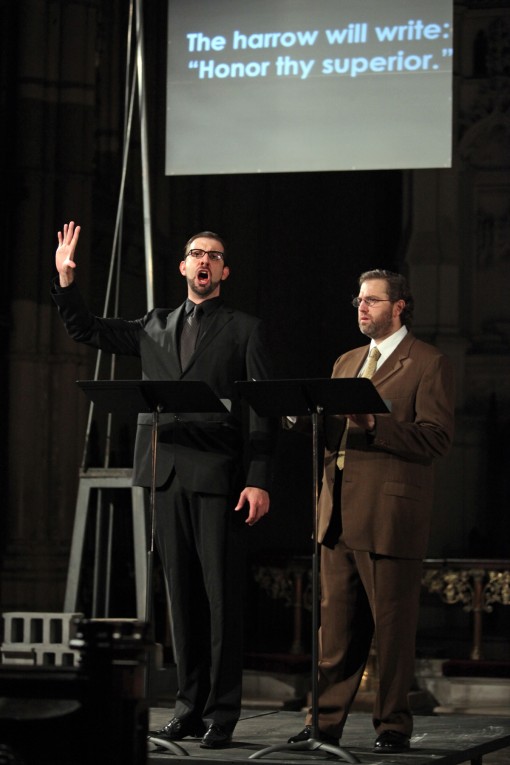A neglected Glass opera grows in Brooklyn with “In the Penal Colony”

Matt Boehler (left) and Jason Papowitz in Philip Glass's opera "In the Penal Colony," presented by American Opera Projects and String Orchestra Brooklyn. Photo: Gerry Goodstein
A short, unsettling story by Franz Kafka provides both source material and title for In the Penal Colony, Philip Glass’s 2000 opera presented by the String Orchestra of Brooklyn and American Opera Projects.
The story is vintage Kafka — an allegory of the opaque, all-powerful state, wherein detention and punishment are devoid of due process or reason. The timing of these performances is undeniably apt, given the ongoing debate about U.S. methods in the war against radical Islamists.
Glass’s exploration of Kafka, undertaken a year prior to 9-11, is more than topical. The two share a similar aesthetic and existential ground; a sense of the unreal pervades the author’s sinister tales as well as the composer’s hypnotic, abstracted music.
The match was mixed, however, at this celebration of Glass’s upcoming 75th birthday heard Saturday night at St. Ann and the Holy Trinity Church. Although sung and played quite beautifully in places, the 80-minute work took considerable time finding its rhythm and internal rapport.
Billed in the program as “a semi-staged performance,” In the Penal Colony also felt underproduced, even in the splendid venue.
The images and ideas in play here don’t require costumes and costly props — and there were none — but they demand more visual imagination than the bare-bones treatment received.
Musically, In the Penal Colony labors, narratively, under Glass’s chosen structure as a kind of operatic call-and-response, alternating a little too conspicuously between words here and music there.
The 28-piece string orchestra, conducted by Eli Spindel, carried its workload gracefully, from the repeating, inlaid-pattern triads that are a signature of Glass pieces — like the working of a loom — to more impressionistic passages. But some instrumental interludes designed to let dialogue sink in just stalled the tale’s dramatic momentum.
Likewise, the interaction between two talented vocalists, bass Matt Boehler and tenor Jason Papowitz, was halting enough in the early going to dampen some of the words and punchlines in Rudolph Wurlitzer’s English translation.
That is in part the fault of Wurlitzer’s libretto. Boehler, as the penal colony’s Officer, and Papowitz, as a bureaucratic Visitor invited to witness an execution, have to sing their way through some stilted couplets before the language, and their dialogue, began to really click.
Glass and Wurlitzer clearly recognize the absurdism in Kafka’s horror story of a regime run amok, but they haven’t drawn out the black humor as thoroughly as they have the gruesome details and moral implications of imprisonment and torture.
Kafka set his penal colony somewhere in the tropics. Its centerpiece — which we imagine, but thankfully don’t see — is a ghastly killing machine called the apparatus, a sort of needle bed whose method might be called death by inscription: It literally carves the text of the law the condemned prisoner is said to have violated into his flesh.
But execution parties at the old colony aren’t what they used to be. The place has lost focus and fallen into disrepair under new management. The Officer, a holdover, clings to ceremony and protocol while pining for days when the apparatus was well-maintained — and busy — and officers’ children watched killings from front-row seats.
In one of the evening’s most eerily melodic passages, Boehler’s Officer states his governing philosophy: “The principle on which I base my decision is … guilt is always beyond doubt.”
The Visitor isn’t so sure, and as he learns more about the penal colony, he questions whether he has the courage to condemn the murder and barbarity. Glass has scored the Visitor’s dawning realization and moral agony impressively. But still, there’s nothing like reading Kafka’s 1919 text, unaccompanied, to understand what people are capable of when they decide to place security before liberty.